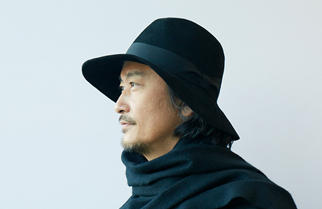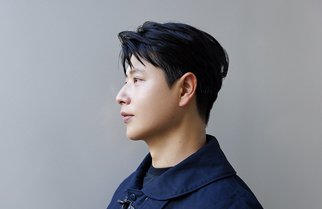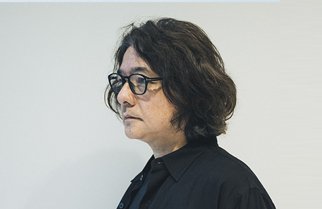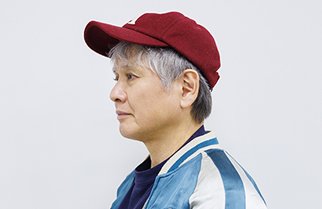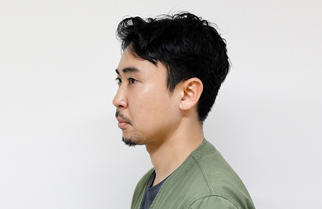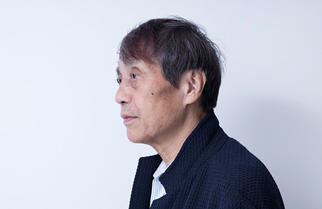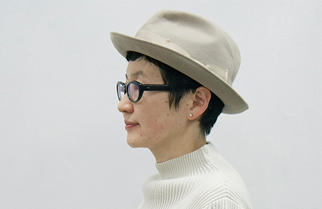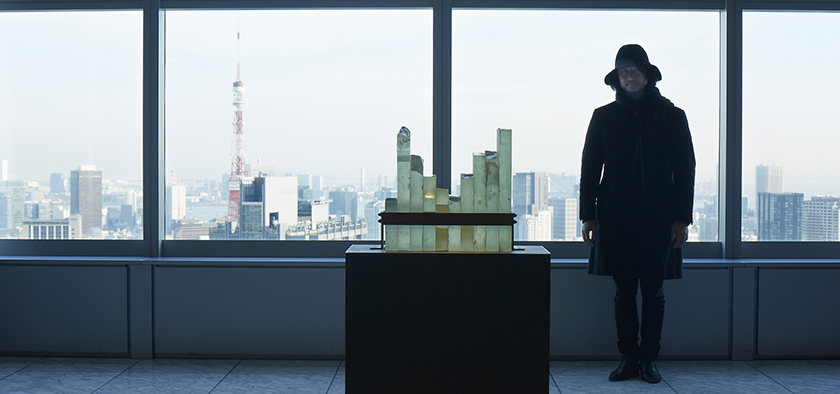
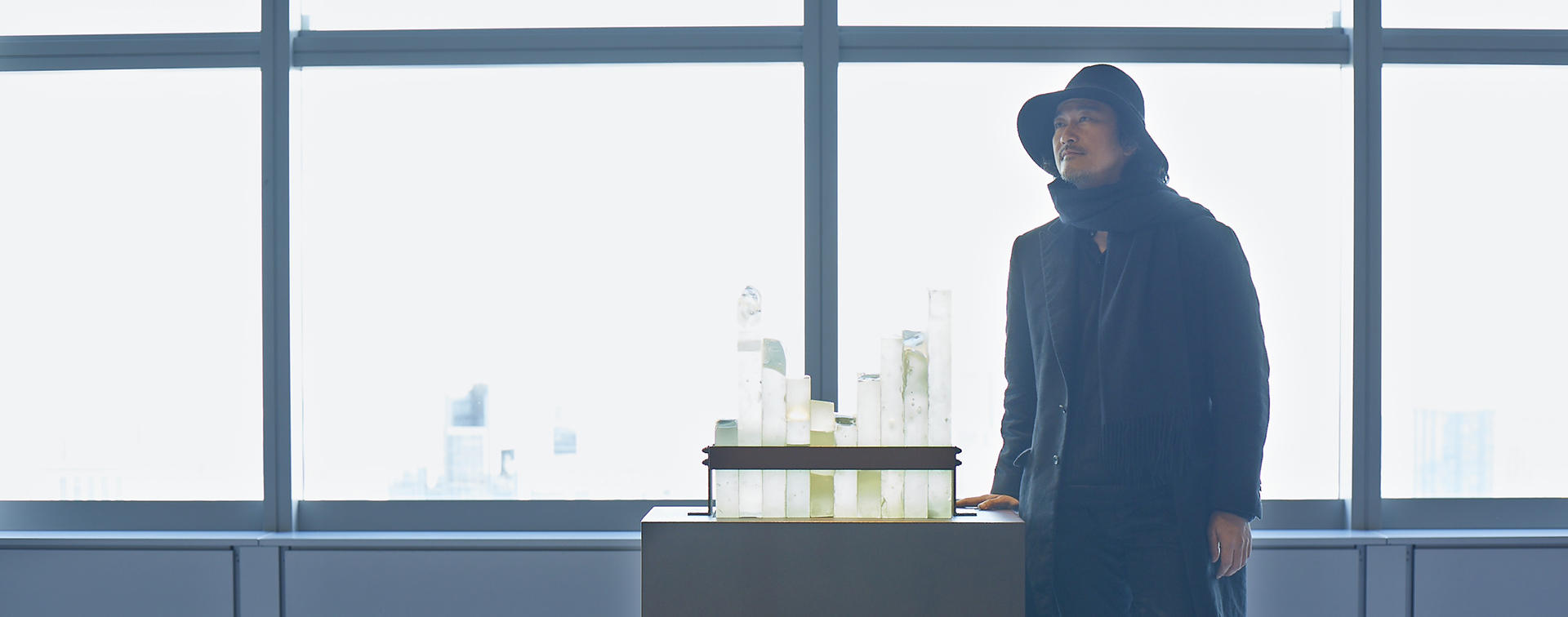
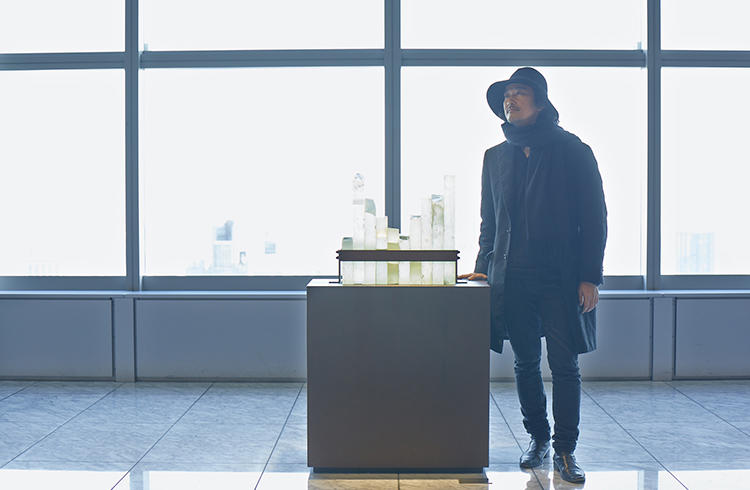
“The kind of future that everyone wants”
A place with all the basic essentials where people naturally create art
Kazuaki Kiriya, who moved to America when he was 15, has worked as a photographer on numerous CD jackets and has participated in many promotional video and commercial projects. He is also known for directing the movies "Casshern" and "Goemon." His latest work "Last Knights", which is his first Hollywood movie, was released in November 2015. The first question that we posed to Kiriya was "What can we do make Roppongi into an area for movies?" Please read on to find out his reply.
Roppoingi looks like a testing site for design experiments
That would be impossible! The authorities wouldn't allow it. You wouldn't be able to get permission for shooting in Roppongi. In fact, you wouldn't be able to shoot in any other place in Tokyo or anywhere else in Japan. There are too many regulations and you can't make movies. Some local governments have recently set up film commissions but the regulations are extremely strict compared to those of other countries.
And in any case, I wouldn't want to shoot a movie in Roppongi. The place doesn't have any reality now, does it? When I was a teenager and living in America, I would sometimes come to Japan and have fun in Roppongi. The place used to be interesting then, but unfortunately it's been developed. The biggest reason I wouldn't shoot in Roppongi is that the people who live here don't seem real.
I think cities should reflect the dual aspects of society - the respectable side and the shady side. But in Roppongi, they've disinfected and sterilized everything. Perhaps the designs of the buildings are interesting, but there's no human warmth. To me, Roppongi looks like a testing site for design experiments.
Whose future are we talking about?
Of course, there are times when I visit Roppongi. I go the Union Square Tokyo - the restaurant in Tokyo Midtown or to lounges and kyabakura (hostess clubs). (laughs) Ropppongi is conveniently located, and I'm sure that it must be a nice place for people with money who live in Tokyo Midtown or Roppongi Hills. But I hardly ever come here by myself. When I visit it's usually because someone has taken me here.
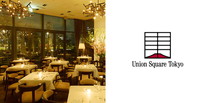
Union Square Tokyo
A restaurant that opened in 2007 in Tokyo Midtown (on B1 of the Galleria's Garden Terrace). It is the first overseas sister restaurant of the popular Union Square Café in New York and has a modern and comfortable ambience. It offers New American cuisine featuring fresh produce procured in Tokyo.
I'm not sure how to describe it, but I can't help feeling that things in Roppongi such as design and art and fashion are very superficial; it's as if people are trying to overcome their inferiority complex. Japanese people who can afford to live in an area like this are a minority - they probably comprise less than 0.1% of the whole population.
By the way, this [interview] is called "Roppongi Future Talks", but I wonder whose future we are talking about? You write about design and art and connecting people with the area, but I don't know who exactly you have in mind. Are you thinking about the people living in Roppongi? The residents of Minato Ward? Or the Japanese people or earthlings in general? It's possible to come up with all kinds of ideas for 0.1% of the population to have fun, but that has absolutely no relevance for the people living on the other side of the world.
A time will come when we will have to live simply
If you are thinking of doing something for everyone in the world, all the money that is being spent for this sort of thing should be distributed to people right now. The simple fact is that the exploitation by Japan and the industrialized countries is leading to poverty and civil strife. People want wine from France and all kinds of items sent to them by airplane. Oil is used as fuel for airplanes, and because of the scramble for oil, there are endless wars. The refugees in Syria would like us to help them first before talking about matters such as design and art.
The first thing we should do is to stop exploiting. For example, at this time of year, many illumination events are held, but those events should be scrapped. After the disaster (the Great East Japan Earthquake in 2011) people were so earnest about cutting down on electricity consumption, yet we still have these illuminations. And I don't think we need luxury items that are shipped by air. We should have local production for local consumption and try to be as self-sufficient as possible. But people don't want to do that.
We need to live more simply. It's inevitable that we will live simply in the future. We can't continue our current ways. Very soon, we will go bust.

Trying to be distinctive leads to prejudice
Apparently there's a desire to make Roppongi a place that people in other cities would envy - to turn it into a place that is as attractive as London or New York. That is what this is all about, isn't it? People often talk about how towns need to have their own distinctiveness so that they don't become obscure and get forgotten by the world. I think it would be better if such values didn't exist. Focusing on distinctiveness leads to prejudice.
What is the distinctiveness of the Japanese people? Is it honne and tatemae (real feelings and social façade)? Is it hospitality? I know a lot of Japanese who are living their lives according to their true feelings. And as for hospitality, the service in America is excellent these days. On the other hand, there are so many Japanese who are not hospitable, don't you think? (laughs) Some people who watched "Last Knights" say it's a movie about bushido (way of the warrior), but knighthood in the West is roughly about the same values - the willingness to sacrifice your life for something that matters to you. It exists in every country in the world.
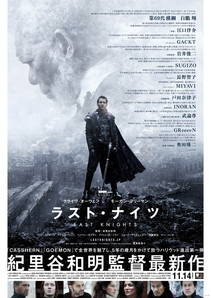
Last Knights
A movie starring Clive Owen and Morgan Freeman and which marks Kazuaki Kiriya's debut in Hollywood. The setting is a feudal empire and is based on the "47 ronin (warriors)." It tells the story of Raiden, a warrior who seeks vengeance for the death of his master and who, with his clan, fights back against an oppressive emperor.
It's only the Japanese who are talking about what makes them distinctively Japanese. The fact is that there's not much difference. They just want to form stereotypes. Saying that people in New York are like this or that people in Roppongi are that - that kind of categorizing is so boring. And in any case, I believe that in the future, we will no longer have cities. The communication infrastructure has developed so much and you can order anything from Amazon. Even today, I don't see the point of living in the city.
Demolishing Tokyo Midtown and Roppongi Hills
In Roppongi, the policy in the last decade or so has been to remove the messiness, and subsequently, a lot of things have quickly vanished. Yet there are many people who say that Roppongi was better in the older days. It's clear that people can't make up their minds - just like Roppongi Future Talks. (laughs)
They shouldn't have developed Roppongi. They should have left it as it was. I wish Tokyo Midtown and Roppongi Hills could be demolished now. There's a big problem in the way they are trying to control the area. It's not possible to create a true culture in an area by just installing artworks and building art museums.
All this is apparently driven by an inferiority complex and a sense of longing. There seems to be a hope that if we make certain things, the Japanese people will become more creative or artistic. So all these things have continued to be made, but we are going in the opposite direction of the intended goal. As far as I can see, there is nil creativity here.
Rules and systems hamper creativity
To make a place really creative, the commercial facilities should be demolished and the traffic lights should be removed. Creativity is not born in places where there are rules and systems. That's why chaos is needed. If you want to be creative, all you have to do is to just live according to your own impulses. But you are stopped from doing that because the government won't allow it, the system won't allow it, and the community and the neighborhood won't allow it.
For example, if I were to wander around in my underpants, fanning myself with an uchiwa (traditional Japanese fan), someone would say, "Excuse me, you are spoiling the scenery, so please go away." It's contradictory to try promoting creativity in an area where people can't even dry their laundry the way they like.
Rich people who have a longing for creative things have done all sorts of things and as a result, artists are making artworks which attract money. There is a similar situation in the movie industry. It's become increasingly difficult to make works that you believe would be truly good. Incidentally, when a person becomes rich, he first buys a nice car and a nice house and gets a lover. Then he buys a yacht, a summer house and artworks. And after that, he invests in movies. (laughs)
Roppongi used to be fun in the past
In Roppongi in the past, there was a strong "no rules" atmosphere. There was a sense that you could do anything and it was a very fun, very creative place. Kabukicho still has that atmosphere. In the post-war period, the "no rules" mood pervaded the whole of Japan and that's why there was vibrancy.
Then they made rules and regulated and systemized everything and now peoples' souls are dying. Humaneness has been taken away from people and humans are no longer humans. Such are the people who live in Japan and in Roppongi. They don't seem real. They might as well be robots.
By the way, this Roppongi Future Talks is also a system. If you really want to build a creative world, you need chaos, anarchy. People who have money should give their money and say, "Do what you like with it." Actually, that sounds like an instruction, so it would be better if they said nothing at all and just gave us the money. (laughs) But of course, there are few people who are that generous.
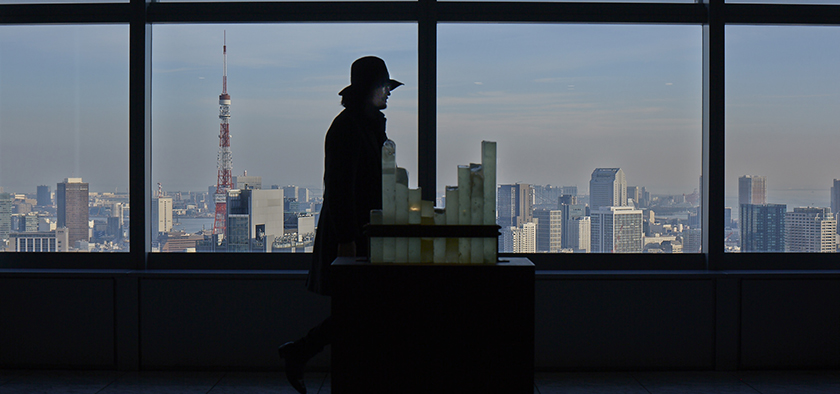
Trying to make a difference in the world
Ultimately, I think it would be better for the earth to die... Ah, I've finally said it. Such a lot of people are suffering now due to the current system. In such a miserable world, what point is there in talking about design and art? When making movies, I often ask myself, "What am I doing?"
What I want to say is essentially this: Why is there such unnecessary strife on this earth? Why do we create such unnecessary suffering? In my works, I try to convey my thoughts. Although even John Lennon's powerful "Imagine" wasn't able to change the world, I still hope to make a difference by what I do, however small it may be. I can't tell whether I'm succeeding, but I do want to play my part and contribute. The more I try, the more helpless I feel, though.
Humankind's enthrallment with chaos
Cities, governments, the economy, and the world are in turmoil and people are increasingly casting off their humaneness by placing themselves in systems. People join systems that are called schools or workplaces - they happily become parts of a machine in a factory. They don't even try to find out what the factory is making. It doesn't concern them if the factory is turning out the worst things for the earth. Earthlings revel in this chaos.
There is a persistent madness in humankind. The madness has existed since the old days. In the Middle Ages, women with red hair were thought to be witches and they were systematically captured and burnt at the stake. Did you know that hundreds of women were killed that way? You might think it a terrible story, but similar things have continued to happen and are still happening.
I don't want to be involved with such confused people - with such a confused society. I have no wish to burn anybody at the stake and I don't wish to get myself burned. I think that unless people clear their minds of their confusion, there will never be peace. But I suppose that if you have peace within yourself, you can stay calm however chaotic the world may be. And anyway, wanting to solve the mess is something your ego you wants.
Starting by thinking about the bare essentials
In order to stop war and hunger, we should stop exploiting and make a system that doesn't exploit. It's as simple as that. What we need to do specifically is to reduce our consumption, and stop craving things that we don't need. A person can live if he has some rice, a roof above his head and a blanket to keep him from freezing to death. The madness starts a little later on, after the basic needs have been met. Thoughts comparing oneself to others - such as "I'm above you" or "I'm superior to you", or "I want people to notice me" - combined with vanity and egoism make everything go awry.
When you think about these things from that perspective, design and art seem like very small matters. Krishnamurti said that something to the effect that there are art museums in cities because cities have no nature. In other words, when people live in places without beauty, they seek beauty and artificially create art.
Nonetheless, I think there is a role for design. We should use design when thinking about measures such as how to provide people with the bare necessities. Design is the fusion of science and art. Design is about thinking how we can build an inexpensive house with the minimum of materials, and how we can mass-produce them. Design is needed for making solar panels that generate electricity with the maximum efficiency or providing meals that have the minimum nutrients and are enjoyable to eat. We should begin by addressing those issues first.
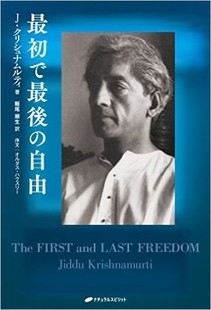
Jiddu Krishnamurti
Indian philosopher and religious teacher. (1895-1986) Dissolving his own religious organization at the age of 34, he traveled the world throughout his life, holding discussions, giving talks and writing books. His ideas were supported not only by religious circles but by a wide range of people. The photograph is of one of his representative works "The First and Last Freedom."
Will technology, design and art solve the chaos?
Maybe in the future, technology and design and art will provide solutions for the chaos in the world - and even its madness. I hope for that. But I think it is very unlikely if we continue to have a society that is tied down by established interests.
I feel it would be easier to create a totally different "country" - a place that would cast aside capitalism, and which would not let in any outside values or systems. We would grow our own food, and we would have water and housing and proper education. And if anyone were to fall ill, there would be people to look after them. Everyone would come together and have fun holding plays, or drawing pictures. People would naturally create art, and the works would have no price tags.
It would be great if there was such a place. I would want to live there. I think that's the kind of future that everyone desires at the bottom of their hearts.
ditor's thoughts
At the end of the interview, Kiriya-san laughingly said, "This is going to turn out as a very short article, isn't it?" Indeed, we had to shorten it slightly due to space restrictions, but we did as little editing as possible and the flow of the interview has been left unchanged. (edit_kentaro inoue)




